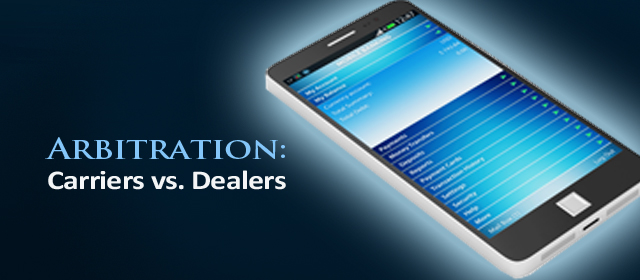Franchise 101: New Revenue Recognition Rule; and Lifeline Franchise?
November 2018
Franchisor 101: New Revenue Recognition Rule for Initial Franchise Fees

Most franchisors’ annual franchise registration renewal deadlines are a few months away. Nevertheless, franchisors should contact their accountants now regarding a new revenue recognition rule issued by the Financial Accounting Standards Board (FASB) that affects financial reporting for franchisors.
Under the new FASB rule, revenue from initial franchise fees cannot be recognized until the franchisor performs obligation(s) separate and distinct from the intellectual property (IP) license granted to franchisees. Revenue from services that are not separate and distinct from the IP license cannot be recognized immediately,but must be recognized pro-rata, over the term of the franchise agreement. Franchisors must distinguish performance obligations that are separate and distinct from the IP license granted to franchisees, and assess their value compared to the value of services not separate and distinct from the license to use the marks and system.
As an example, a typical franchisor might provide franchisees with an in-person classroom training program and an on-site training program before and just after opening for business.
Training can include topics like business management, accounting,record keeping, banking, payroll, opening and closing, efficient operation,cleanliness, vendor relationships, buying procedures, and information on starting and operating the type of business in the franchisor’s system. Delivering this training would likely be a performance obligation separate and distinct from the IP license granted to the franchisee. This is because the franchisee could use this training to operate a business without use of the franchisor’s brand. If the franchisor determines the standalone sales price for this training is $5,000, that amount could be recognized as revenue when the training is completed.
On the other hand, training could also include topics like use of the franchisor’s distinctive brand-specific operating procedures, merchandise and services, brand-specific routines, methods, techniques, and the like. This would likely not be a performance obligation separate and distinct from the IP license granted to the franchisee. This is because this training could not be used separate and apart from the franchisor’s system. If the franchisor determines the standalone sales price for this training is $10,000, that amount could be recognized as revenue only on a pro-rata basis spread over the term of the franchise agreement.
One effect of the new rule is to require franchisors defer recognition of substantial amounts of initial franchise fee revenue. By planning now, positive steps can be taken to mitigate the impact of the new rule, allowing franchisors to reduce the portion of initial fee revenue for which recognition must be deferred. Therefore, franchisors are encouraged to discuss the new rule with their accountants now. You are welcome to let us know if you or your accountants have any questions.
Read: FASB Financial Reporting for Franchisors’ Rule Memo
Franchisee 101: A Lifeline Franchise?

When you pay your phone bill, part of the taxes go into a fund used by the government to subsidize cell phone service to qualifying individuals, under federal and state Lifeline programs. Phones typically reach the end customer through pop-up street vendors, such as at a table or booth with a “free phone” banner identifying the cell phone carrier, to attract and enroll subscribers to the subsidized service. Is this location a franchise of the carrier?
A California federal court confirmed an arbitration award against a master dealer of Lifeline cell phone service, who claimed the carrier sold a franchise and unlawfully terminated their dealer agreement, in violation of California law. Lewitt Hackman’s Franchise & Distribution Practice Group represented the carrier in defending the master dealer’s claim that the parties’ relationship was a franchise under both California and Michigan law,and secured a judgment against the dealer.
A franchise relationship has three elements: (1) the franchisee is required to pay, directly or indirectly, a franchise fee; (2) the franchisee offers goods or services under a marketing plan or system prescribed insubstantial part by the franchisor; and (3) the franchisee’s business operations are substantially associated with the franchisor’s trademark or other commercial system.
The arbitration panel found the franchise fee element was not satisfied because the dealer’s purchase of name tags, t-shirts, table covers and banners featuring the carrier’s logo was optional and solely the dealer’s decision. It could not show the carrier required buying more of these items than what was provided for free to operate the business. The parties’ agreement had no minimum performance obligation, and the dealer agreed to maintain only one sales location. Evidence of “pressure” by the carrier to start enrolling Lifeline subscribers and maximize placement of sales agents were merely non-contractual requests. There was also substantial case authority for the proposition that the dealer’s purchase was an ordinary business expense, and therefore not an investment that would constitute a franchise fee. Thus, the arbitration panel found the master dealer failed to prove it was required to pay, or agreed to pay, for the right to enter into what was an ordinary dealership agreement and not a franchise relationship.
The panel also found that the marketing of the cellular company’s Lifeline service was prescribed in large part by industry custom and practice(as opposed to being prescribed by a plan or system from the carrier),including the mandate to comply with expansive governmental regulations applicable to carriers offering Lifeline service. Nor was the dealer’s association with the carrier’s trademark a substantial one because the dealer’s website included both the carrier’s mark and 19 other cellular wireless brands.
Additionally, the panel held that the dealer did not suffer damages because the dealer’s future profits, or the value of the business itself, proved to be speculative due to potential regulatory constraints and the dealer’s shortened operating history of only six weeks. Finally, because the relationship was not a franchise, the carrier’s termination of the dealer was lawful and in accordance with their agreement, which was at-will.
Prior to termination, the carrier approached the dealer with a business problem that threatened the continuation of their relationship and attempted to solve it amicably. Despite having an opportunity to avoid termination and continue operating a successful business, the dealer chose to litigate the elements of a franchise instead of compromise, and now owes the carrier attorney fees under a fee-shifting provision in the dealer agreement.